Do you have a hamster that just won't stop bar-chewing? Don't be alarmed as this is a normal thing to experience as a hamster owner. And after researching this topic, we've discovered ways to prevent the bar-chewing from reaching excessive levels.
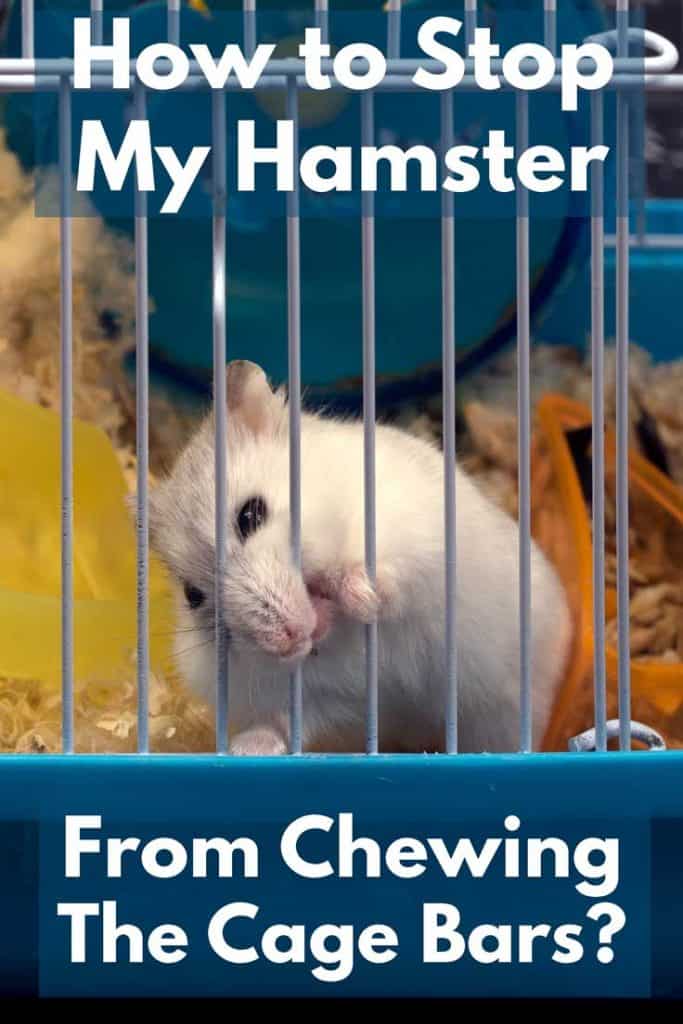
If your hamster chews on the cage bars it's probably because the cage is too small. Otherwise, your hamster may just need more chew toys and other forms of entertainment to fight off boredom.
To stop a hamster from chewing the bars of a cage, try the following -
- Switch to a larger cage
- Fight boredom by making the cage more interesting
- Offer more chew toys and treats
If these measures don't help, you could consider putting lemon juice on the bars, or even switching to a glass tank with no bars. Please don't do this as your first and only solution - you need to figure out what your hamster needs are and help make sure they have a spacious enclosure with plenty of entertainment.
This brief overview moves through these solutions rather quickly. I'll use the rest of this post to dive deeper into the issue at hand. If you continue reading, I promise this information will help ensure your hamster's bar-chewing doesn't keep you up at night!
Contents
Addressing Your Hamster's Bar-Chewing Tendencies

The first thing you need to understand is that chewing on objects comes naturally to hamsters. It's a part of their biological process because their incisor teeth are always growing: the chewing helps keep the size of these teeth in check.
Hamsters should get plenty of safe chew toys which they can munch on to their heart's content. If a hamster still takes an occasional nibble at the cage bars, that may be ok. But sometimes, chewing the bars becomes excessive, and too much gnawing on the metal can harm your hamster's teeth.
To stop this behavior, we must first address why a hamster's bar-chewing habit has escalated?
How to stop a hamster from chewing the cage bars
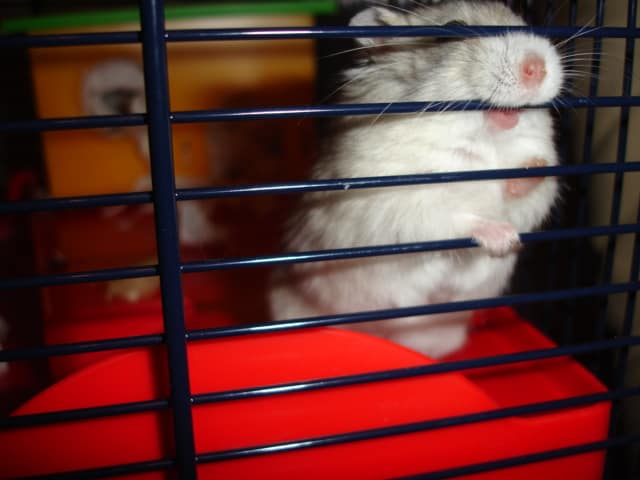
There are many different reasons your hamster bar-chewing habit has become excessive. The main ones are simple things like boredom, the cage is too small, or just needing something to chew on. We'll go over each possible reason here, and how to address the issue.
Their Cage is Too Small
The ASPCA mentions 20 gallons as the minimal hamster cage size but they also say that you should get the largest cage you can afford. 20 gallons for a hamster tank is only the minimum.
Some hamster care experts suggest 360 square inches as the minimal size for a hamster cage while others go as high up as 450 square inches. And that's for a single hamster, of course. You should never have more than one Syrian hamster in a cage and even housing more than one dwarf hamster in a cage would depend on your setup and how well the hamsters know one another.
If your cage is smaller than the recommended 360 square inches, then bar-chewing could be a symptom of your hamster feeling trapped.
It also doesn't help that hamsters aren't used to living in such a confined space. Hamsters in their natural habitat are free to roam wherever they please. And a cage is the antithesis of the natural environment they'd be used to in the wild.
When the cage is too small, the hamster's natural instinct tells him to try and get out - by literally chewing its way out.
The Solution: get a larger cage
The solution for this issue is simple, get them a bigger cage. Once you offer them a more substantial living space, their bar-chewing should cease. It will provide them with more to do and room for their various adventures.
Not sure about your cage size? Read this: What Size Cage Does A Hamster Need
And if you see that a new cage is needed, make sure you read this guide first: How To Choose The Best Cage For Your Hamster
Another way to increase your hamster's territory would be by using tunnels. You can construct complex structures of hamster tunnels, providing your hamster with safe areas to explore and spend time in.
Read more: Why and How to Make Hamster Tunnels (The Complete Owner’s Guide)
Your Hamster is Bored
A likely reason for your hamster's bar-chewing is boredom. The bar-chewing becomes a symptom of your hamster not having enough mental stimulation. The bar-chewing becomes an outlet, which gives them something else to do inside their cage.
You could view this as their cry for help, in a way, as chewing on metal bars is probably quite painful. Chewing the bars also doesn't provide the satisfaction a hamster would get from tearing through a piece of cardboard or wood.
The Solution: environmental enrichment
If you suspect that your hamster's bored, offer your pet more stimulation. This is called environmental enrichment. You create an environment with more interesting things to do. These elements help your hamster exercise their physical and mental capabilities. More stimuli keep your hammy busy and away from chewing the cage bars.
Ways to do that include -
- Adding a variety of hamster toys, including hamster chew toys like these.
- Constructing a maze of hamster tunnels.
- Enriching your hamster diet with healthy treats.
- Taking the hamster out of his cage more often.
Providing mental and physical stimulation is a crucial part of good pet care. Please take a few minutes to read this guide in order to learn more - Is My Hamster Bored? (And What to Do About It)
Don't forget exercise for your hamster
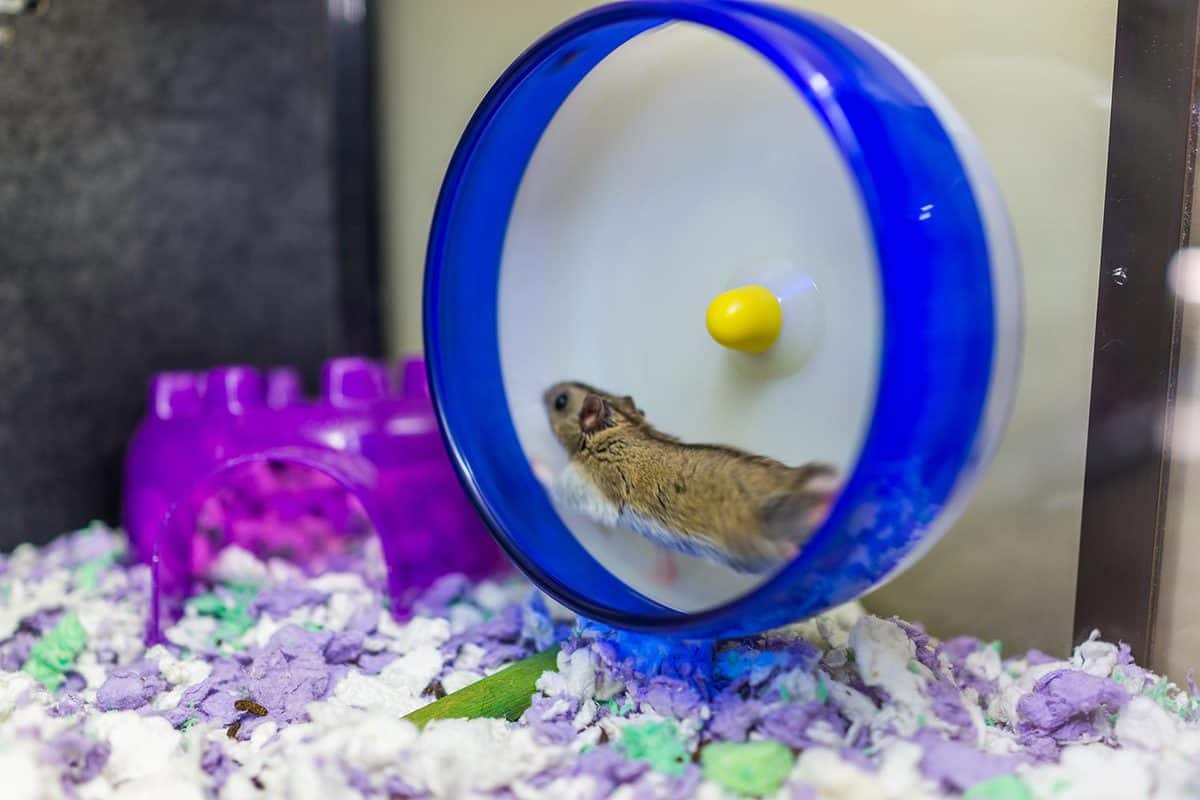
Make sure a good hamster wheel is available at all times. Some people remove the wheel during the night, to avoid the noise. This could actually be very stressful for a hamster, eventually leading to stress-related behaviors like bar chewing.
While it can be quite frustrating to try and sleep with a hamster running on their wheel all night, removing the wheel takes away your hamster's primary outlet for all their built-up energy.
It would be in both of your best interests to keep the wheel functional during the night. There are several low noise-operation wheels available on the pet product market.
Check out this low-noise hamster wheel on Amazon
Regardless of the option you choose, it's all about finding a way to rid your hamster of their nervous energy: treats, more wheel time, or having a play session right before bed. Any of these options - and preferably several combined - would help.
Not enough chewing alternatives
Hamsters are rodents. They love chewing. In the wild, hamsters eat hard roots and plants. They also chew through plant material when they dig their underground tunnels. Gnawing is part of being a hamster, and a major part at that.
If there's nothing else to chew around, your hamster becomes more likely to chew on the harsh metal bars of the cage.
The Solution: Offer chewy treats and chew toys
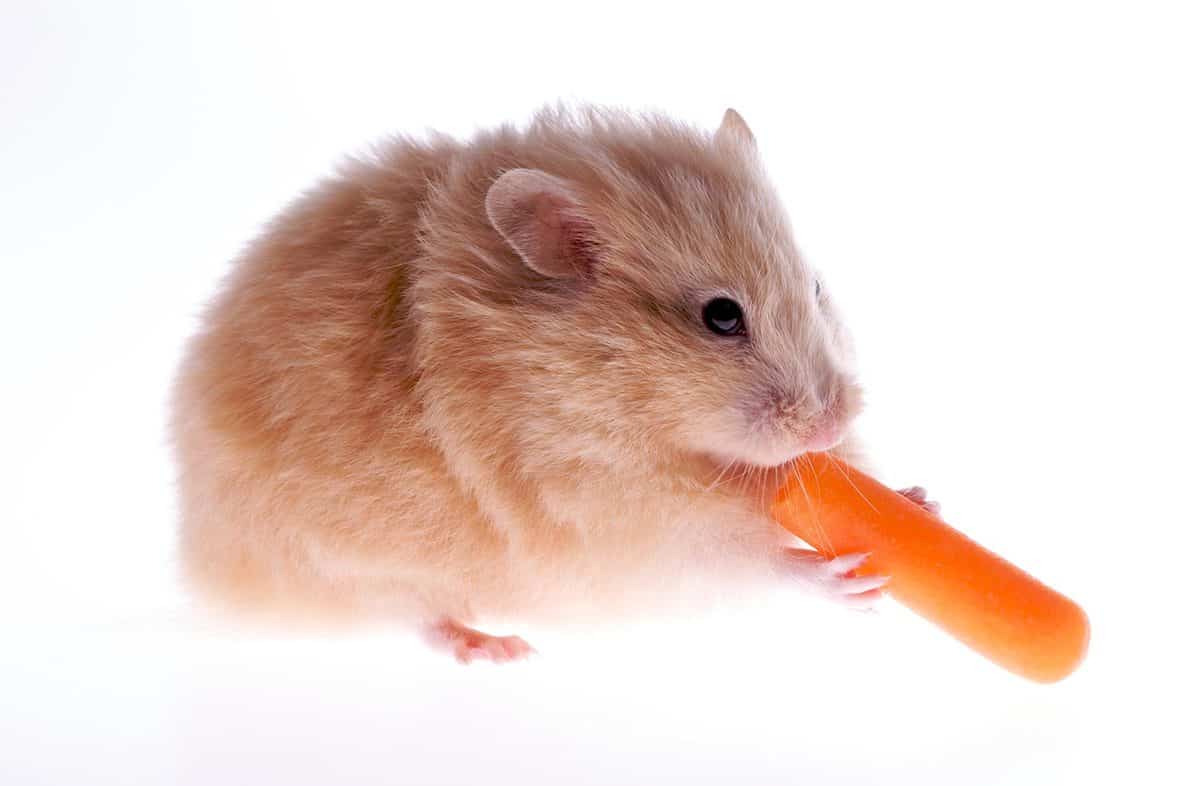
Make sure your hammy has plenty of excellent chewing alternatives available at all times. Make sure to provide some healthy fresh vegetables. The high fiber content makes these crunchy treats fun to chew on. Just remember to provide an overall balanced diet that contains enough nutrients overall.
Read more: What Treats Can I Give My Hamster?
Going beyond food, provide your hamster with special chews, or chew toys. Chew toys or chew snacks provide your hamster with an excellent way to naturally put those chewing instincts into action. Offer variety and see which ones your hamster prefers.
Check out these natural chew toys on Amazon
Don't limit yourself to one solution
Gnawing on the cage bars is a sign that something's very wrong in your hamster's life. You need to take action and improve all aspects at the same time. If your hamster's cage is smaller than the recommended minimum of 360 square inches, order a new cage right away.
Don't forget to get the right bedding and overall make sure the cage contains everything your hamster needs. Invest in chew toys as well as setting up a hamster gym made of tunnels, wheels, and other toys.
Get your hamster the best possible living conditions, and you'll have a happy pet that won't resort to chewing on metal or plastic cage bars.
Can a Hamster Bite Through Their Cage?
All this talk about hamster's bar biting probably pushed the following question to the front of your mind: can a hamster bite through their cage? Can they actually tear the bars apart and get out? If you have a metal cage, the answer is most likely no.
Even the most determined hamster would have an incredibly hard time biting through these bars. They're typically made from materials that are much stronger than a hamster's teeth.
But on older cages that have worn down bars, your hamster biting through the cage is possible. The hamster could grind down the bars enough that'll be able to break through parts of the cage. Although this occurrence is still rather unlikely and the cage would've had to suffer a significant amount of damage.
If you're even wondering if that's the case, it's high time you switched over to a new and much larger cage.
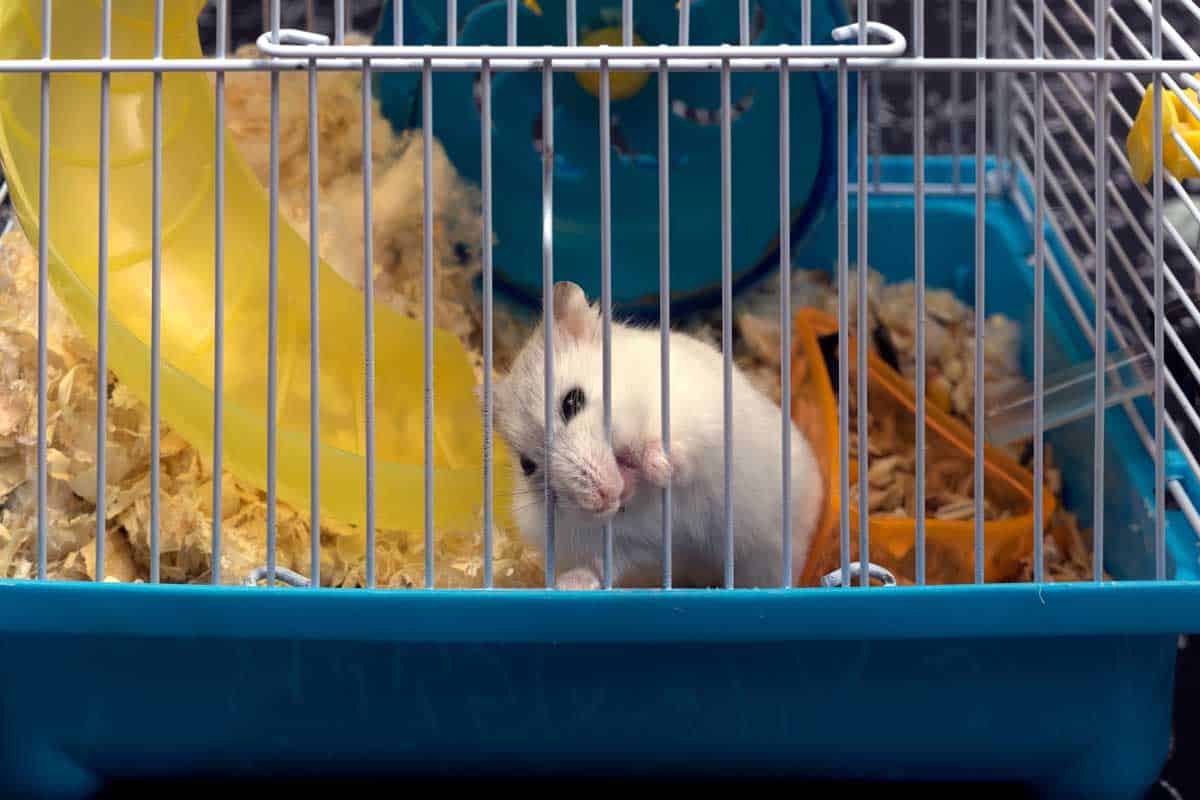
Will a Hamster Hurt Themselves by Excessively Bar-chewing?
We all know how bar-chewing can cause a hamster owner stress. A rattling cage can be quite a nuisance to deal with while you're trying to get some sleep. But you might be wondering if bar-chewing is something that's detrimental to your hamster as well?
Well, it turns out your hamster's bar-chewing habit isn't a healthy one. Some serious consequences can arise from this activity:
- Broken teeth: the bars are much stronger than your hamster's teeth, which can cause permanent damage. In some cases, it gets so painful that it becomes impossible for your hamster to eat.
- Bar rub: the skin around your hamster's nose and mouth can become inflamed from chewing on the bars. It will cause extra stress for your hamster, and sometimes the skin gets infected.
Neither of these two issues is something you want to see your hamster go through. It's heartbreaking to witness and something no hamster or hamster owner should experience. What's more, the very act of bar chewing is an indication that your hamster is stressed. That's not good for them.
But with all the information you now have gained, you should be able to nip it in the bud. So please, take all that you've learned and use it to stop this habit in its tracks. Both you and your hammie will better off without bar-chewing in your lives!






Ty for this. We made a nearly 1000 sq ft diy tank for my daughters syrian. It has more space, toys, and chews than its previous bin cage. Had to frame the front with wood to hold the glass front in. Didnt want to, but had too. Despite me siliconing it really well( safe silicone) she has started testing and gnawing on the wood frame that secures the glass, despite the layer of silicone. Applied the lemon juice. She still sniffed and licked, but left it alone,..so far thank goodness.But then i read that lemon juice could burn her throat or hurt her, and I got freaked out. But its just as much of a hazard if she compromises the security of the glass on her home. And even people that have those ikea cages. You need an option if they gnaw the silicone around the glass. Disaster
Nah she just bites and bites the cage I’ve tryed every thing with her
I have a 640 sq inch cage and I got my hamster an hour ago and he keeps chewing on the bars of the cage and climbing the cage. I don’t know what to do because I don’t want to see him get hurt.
My hamster does this to get my attention. She is spoiled and has become choicy about her food, she prefers nuts and seeds and will skip over the other stuff. The minute I walk by, she’ll start biting her cage, to get my attention. Sometimes I ignore her and won’t give her anymore food until she finishes what’s In her bowl, other times, the bar biting is just to annoying to ignore, But I didn’t realizing I was reinforcing her bad habit.. Maybe she just wants my attention sometime, but as soon as I give her, the food she wants, she quits biting her bar.
Are you still having issues with your hamster? I’ve had my hamster close to 4 weeks now. At first my hamster would climb her cage too and was also biting. The petco lady in my area told me if they do that is because they’re confused at first and trying to adjust to their new home. Or either that trying to escape. They also love to climb too. For me, I would recommend you to give your hamster sometime to adjust. Buy chew toys(lots of them) because their teeth continues to grow. Good luck!!